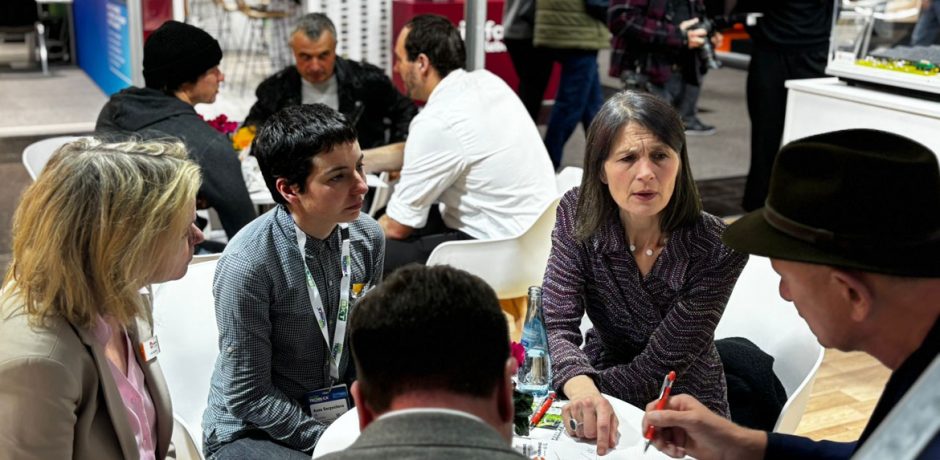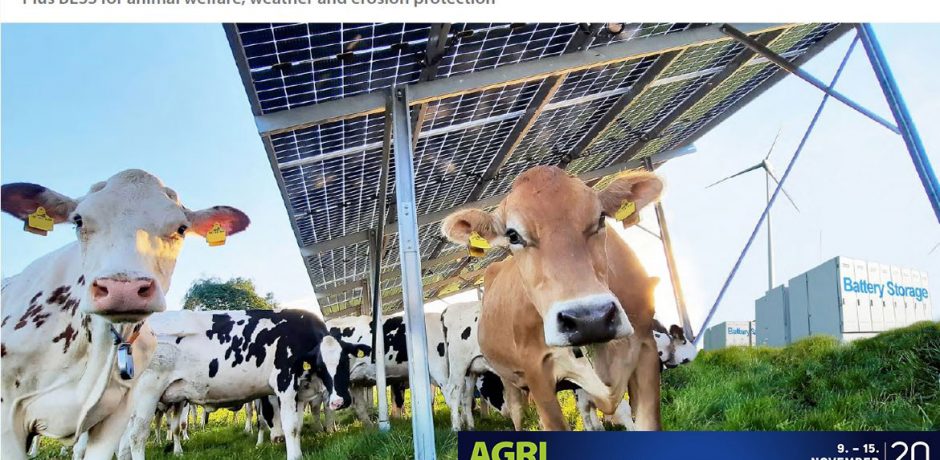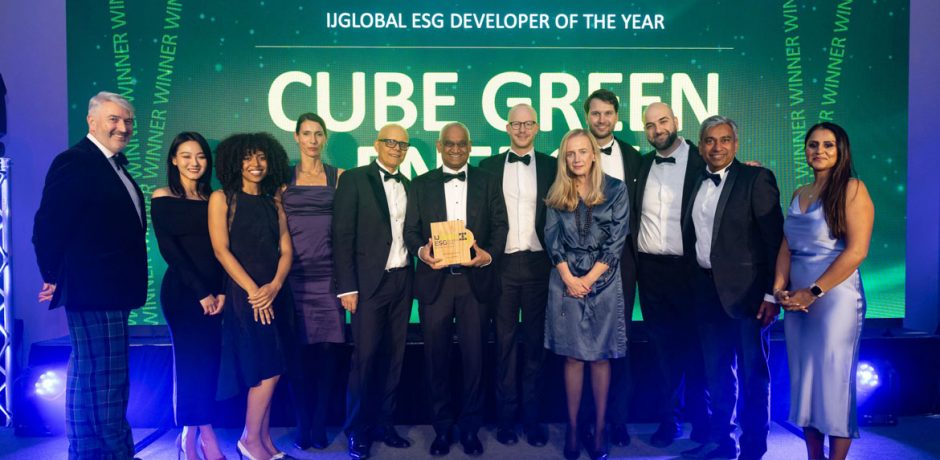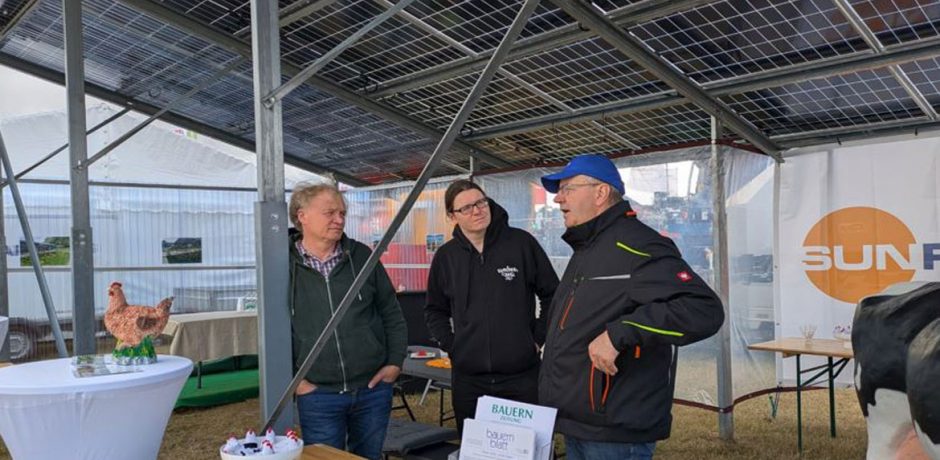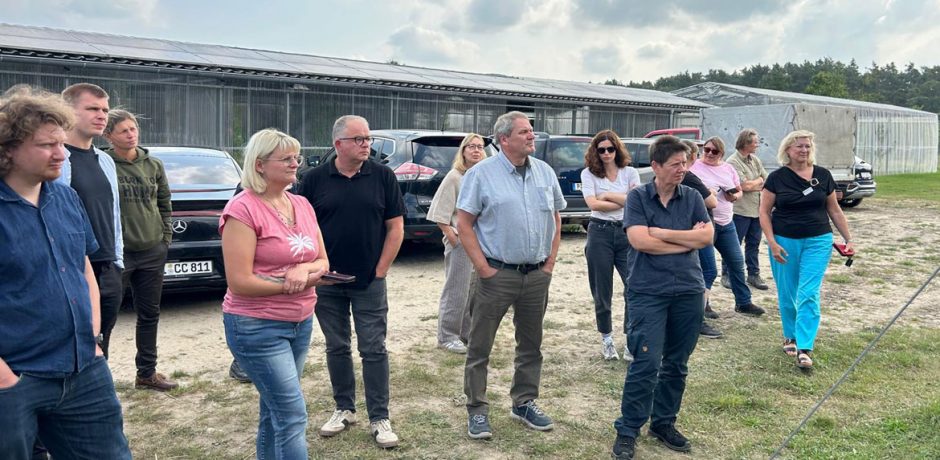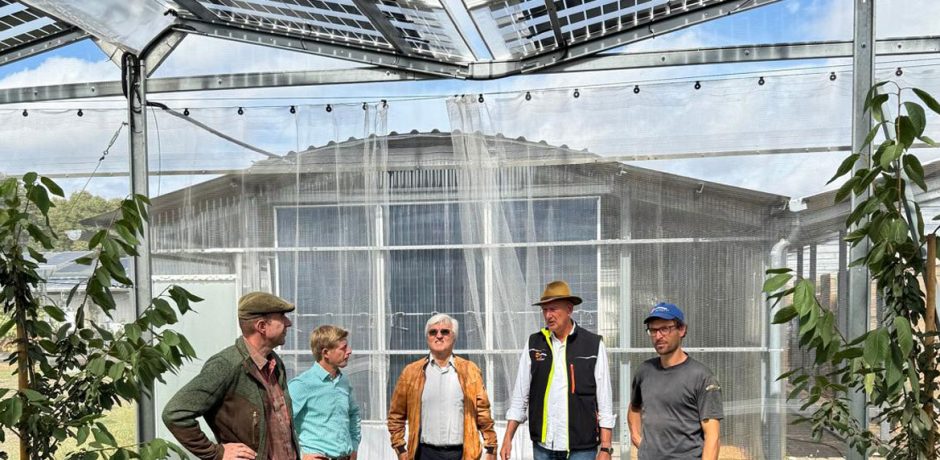Eco- and Agri-Solar
Strong turnout at AGRITECHNICA 2025 – Great interest in SUNfarming’s Agri-PV solutions
At AGRITECHNICA 2025, SUNfarming’s booth drew strong interest from farmers, technology providers, and policymakers exploring practical applications of Agri-PV.
Numerous visitors engaged with our team to learn how SUNfarming systems enable dual land use—combining crop production with clean energy generation.
Discussions also highlighted how Agri-PV can integrate with other renewables like biogas, wind, and battery storage to strengthen regional energy resilience.
The overall feedback was clear: Agri-PV is moving from concept to reality, and SUNfarming continues to be recognized as a key innovation driver in sustainable agriculture.
Agri-photovoltaics: Agriculture and energy production grow together – SUNfarming at Agritechnica 2025
From November 9 to 15, 2025, SUNfarming will be presenting practical solutions and innovative systems related to the future-oriented topic of agri-photovoltaics (Agri-PV) at Agritechnica in Hanover, Hall 24, Booth C28.
The combination of agriculture and solar energy is considered a key technology for the sustainable transformation of the agricultural sector – and SUNfarming is one of the leading pioneers in this field.Efficient dual use: energy and yields from the same area
The great advantage of agri-PV lies in the simultaneous use of agricultural land for food production and energy generation. While the solar modules supply electricity, crops can be grown or animals kept underneath them. SUNfarming relies on flexible, modular systems that can be adapted to the needs of different crops and types of farming – from berries and medicinal plants to vegetable cultivation and animal husbandry.
“Our agri-PV systems offer protection from extreme weather conditions such as hail, heavy rain, and heat, while at the same time generating valuable green electricity,” explains Peter Schrum, founder of SUNfarming. “In this way, they not only contribute to climate protection, but also to the economic stability of agricultural businesses.”
Technological innovation: From rainwater management to robotics
At Agritechnica, SUNfarming will present the latest research results from its own Agri-PV Research and Innovation Center in Rathenow.
Here, various system designs, crops, and cultivation methods are tested under real conditions.
A key topic is the proven rainwater distribution system under the modules: Large-scale irrigation and the natural capillary action of the soil ensure even moisture distribution – a decisive factor for yield security and soil health.
Agri-robotics is also playing an increasingly important role: in Rathenow, autonomous robots for maintenance, irrigation, and harvesting are being tested in collaboration with start-ups. These technologies are intended to reduce the amount of work required while increasing precision in cultivation under PV systems.
New perspectives for animal husbandry and municipal energy supply
In addition to crop production, SUNfarming is also focusing on agri-PV in animal husbandry.
Covering outdoor areas with solar modules provides animals with shade and weather protection, improves animal welfare, and opens up additional sources of income for farms through electricity production.
n combination with biogas, wind power, and battery storage, sustainable energy concepts are created that can also contribute to municipal heat supply.
A current example is the Steinhöfel project, where SUNfarming is preparing to start construction of a large-scale agri-PV system in accordance with DIN SPEC 91434. With a planned output of 150 MWp, this is an important step towards a total of 2 GWp of installed agri-PV capacity by 2030.
SUNfarming at Agritechnica 2025
At Agritechnica, SUNfarming will present various model-scale agri-PV systems and current research results on crop production, animal husbandry, and combined energy production in Hall 24, Booth C28.
Visitors can obtain information directly from agri-PV experts about funding opportunities, technical solutions, and project development options.
Conclusion:
Agri-photovoltaics is much more than a new form of solar energy – it is a strategy for the future of agriculture, climate protection, and regional value creation.
With decades of experience and a clear focus on research and practice, SUNfarming stands for innovative, economical, and sustainable solutions that demonstrate that energy and agriculture belong together.
Proud moment for Cube Green Energy and SUNfarming!
We’re thrilled to share that Cube Green Energy has been honoured with two awards at the IJGlobal ESG Awards 2025 last week:
• Developer of the Year
• Environment Award
• Environment Award
These recognitions are a testament to our commitment to advancing Europe’s clean energy transition through responsible development and sustainable innovation.
Our Sustainability strategy delivers tangible real-world impact - operating in advanced economies reliant on fossil fuel imports with high competing demand for land use, our wind repowering, Agri-PV (SUNfarming) and BESS solutions are critical to maximising land use efficiency while strengthening the long-term energy, food and national security of our core markets, Germany and France.
We also extend our appreciation to our investor, I Squared Capital, for their continued trust and collaboration in our shared vision of a sustainable energy future and to Ulrica Svensnson for her ongoing guidance in shaping our Sustainability strategy and pushing us to always do better.
Congratulations to all the participants for their contributions towards Sustainability!
Successful trade fair appearance by SUNfarming at MeLa 2025
From September 11 to 14, SUNfarming once again presented innovative agri-photovoltaic solutions for agriculture and decentralized energy supply at MeLa 2025 in Mühlengeez.
With a 1:1 agri-solar system (17 x 6 m) in the outdoor area, we were able to demonstrate live how agriculture and energy production can be sustainably combined through intelligent dual use. Numerous visitors came to find out about our concepts for animal husbandry, special crops, and fruit and vegetable cultivation.
The response speaks for itself:
*Around 67,000 visitors in total at MeLa 2025
*Hundreds of technical discussions with farmers, interested parties, and decision-makers
*Great interest in visiting our research and innovation center in Rathenow
*Special appreciation through the visit of Mr. Johann-Georg Jäger, Chairman of the Mecklenburg-Western Pomerania Renewable Energy Association (LEE MV e.V.)
Our agri-PV consultants held numerous discussions and were able to make many new contacts. A particular focus was on the launch of our first large-sca
As part of the Cube Green Energy Group, we will be able to offer our customers even more comprehensive solutions in the future – from agri-PV and photovoltaics to wind energy.
Conclusion
MeLa 2025 was a complete success for SUNfarming. The high level of interest confirms our role as a leading provider of agri-photovoltaic solutions. Together with farmers, partners, and political actors, we are shaping the agriculture of tomorrow—sustainable, innovative, and economical.
We would like to thank everyone who visited us at the trade fair and look forward to the next steps in our joint projects!
Livestock Farming under Agri-PV: Specialist Event at the SUNfarming Research & Training Center
Recently, the SUNfarming Food & Energy Research & Training Center in Rathenow hosted a specialist event on the topic of livestock farming under agri-photovoltaics (Agri-PV).
The event was organised in cooperation with the State Office for Occupational Safety, Consumer Protection and Health (LAVG Brandenburg), represented by the Animal Welfare Advisory Service. Thanks to the funding of the Focus Animal Welfare Network by the Federal Ministry of Agriculture, Food and Community, participation was free of charge.
The event brought together farmers with animal husbandry, representatives of authorities and scientific institutions, as well as experts from consulting, planning, and the solar industry.
Program Highlights
The day began with a get-together and welcome address by Dr. Claudia Possardt (TSBD) and Angelique Buchwald (Netzwerk Fokus Tierwohl, LAVG), followed by a guided tour of the Agri-PV systems on site, which are operated in combination with livestock farming.
The technical program featured a series of expert lectures:
• Luca Unger (M. Münch Elektrotechnik GmbH & Co. KG) shared insights on the behaviour of farm animals in Agri-PV systems.
• Edith Seemann (BRM e.V.) explained the current funding opportunities for Agri-PV in livestock farming.
• Carl Pump (University of Greifswald / Fraunhofer ISE) presented technical solutions for implementing Agri-PV in free-range farming.
• Lawyer Margarete von Oppen (orka Partnerschaft mbB) gave an overview of legal aspects regarding the building application process for Agri-PV on run-off areas.
• Several farmers shared their own practical experiences, providing valuable insights from the field.
Key Takeaways
The event demonstrated that combining livestock farming with Agri-PV creates multiple benefits:
• Improved animal welfare through protection from heat, heavy rain, and frost
• Increased profitability of agricultural land by enabling dual use—energy generation and livestock farming
• A valuable contribution to climate protection and the energy transition
In the concluding discussion, participants emphasized that Agri-PV in livestock farming is not only a technological advancement but also a socially relevant innovation. Many called for simplified approval and funding structures to unlock the full potential of this sustainable solution.
Agri-Solar Meets Medicinal Herbs: First Expert Meeting at the SUNfarming Innovation Center
Rathenow, Germany — The SUNfarming Innovation Center recently hosted its first expert meeting on medicinal herbs, welcoming selected farmers, technicians, and agricultural engineers to explore new opportunities at the intersection of Agri-solar and high-value crops.
Medicinal herbs such as sage, nasturtium, and chamomile are currently being cultivated under solar modules at the Innovation Center. These crops are considered especially attractive in the premium market segment, offering agri-solar farmers new economic perspectives. The first trial results are expected as early as next year.
In parallel, we developed Agri-PV greenhouse systems tailored for industrial customers, particularly in the data center sector. These closed systems use industrial waste heat to create optimal growing conditions for medicinal herbs, ensuring both efficiency and sustainability.
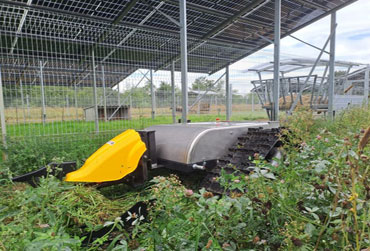
With these innovative multi-use concepts, we go far beyond renewable electricity generation with battery storage. We deliver legal certainty for the use of industrial waste heat and open new economic opportunities for both agriculture and industry.
As a leading provider of Agri-solar solutions, we continue to adapt to market needs — combining energy, agriculture, and industry to create sustainable solutions for the future.
By loading the map, you accept Google's privacy policy.
Learn more
